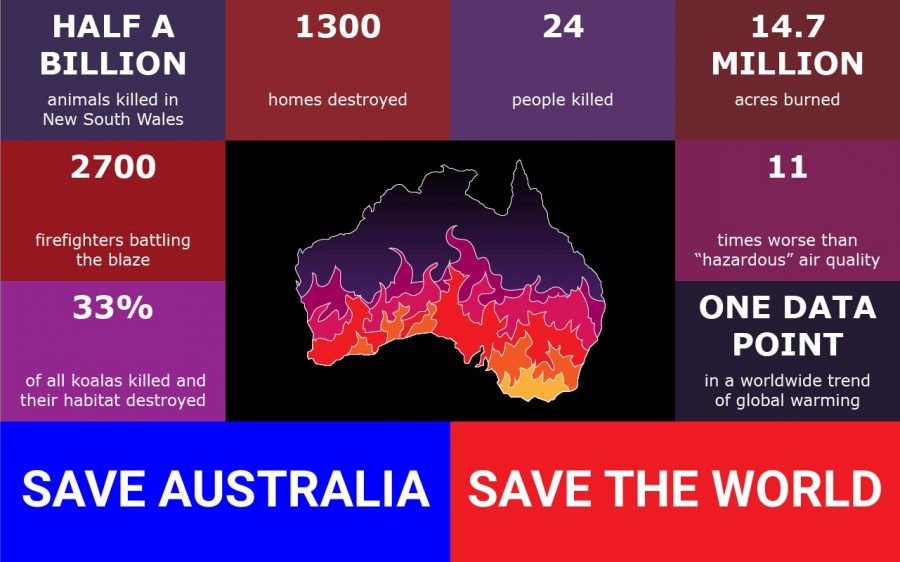Arnoldus: Why Australia is on fire and why we need to act now
Our society has to change for the better, or our Earth is going to change for the worse.
January 16, 2020
Right now, wildfires are ravaging Australia’s people and environment.
“The fires have destroyed more than 1,300 homes, burned about 6 million hectares and killed at least 24 people,” according to the sciencenews.org’s article about the wildfire that is currently scorching Australia’s land. Around half a billion animals have been killed in New South Wales, and there are about 2,700 firefighters working to combat the flames. The Federal Environment Minister, Sussan Ley, says that almost a third of koalas in New South Wales might have been killed in the fires, and a third of their habitat is now decimated.
These fires have been going on for months and have been dangerously affecting Australia’s population. According to one article, “In December, the smoke in Sydney was so bad that air quality measured 11 times the ‘hazardous’ level. In total, more than 14.7 million acres have been burned across the country’s six states. That’s larger than the countries of Belgium and Haiti combined.”
It’s hard to overstate the devastating impact that these fires are having on Australia, but why are they happening in the first place? Carolyn Gramling, an Earth and climate writer, gives us the answer.
“Those wildfires are being fueled by a combination of record high temperatures, long-term drought, very low air and soil moisture going into the normal fire season, and human negligence. But climate change, scientists say, could make such extreme, deadly blazes three times as common by the end of the century.”
This news should be alarming to all of us. If we don’t act soon to combat climate change, our world will burn.
An ecologist from the University of Sydney, Professor Wardle, reminds us that although the government could act to prevent climate change, it’s not doing nearly enough.
“It hasn’t just been fires, there’s been flood, there’s the drought,” she said. “Every time [the government] has had the chance to take on the big issue of climate change and do something, they choose not to and blame other things like land management.”
Climate change is a real issue that our politicians are fond of ignoring, and if that doesn’t change, there will be major repercussions for our Earth. According to the UK Parliament’s Environmental Audit Committee, the Arctic is warming twice as fast as the rest of the planet and could be ice-free by the summer of 2050. NASA has already reported seeing sea ice shrink, sea levels rising, and an increase in the intensity of heatwaves. Droughts in the Southwest, as well as heat waves everywhere, are projected to intensify in the coming years. Hurricanes will start occurring more frequently and intensely. The sea level will rise 1-4 feet by the year 2100.
If these statistics were scary in the past, they’re even more foreboding now that we’re seeing the actual effects of what we’ve done to this planet. Australia’s fires are just one data point in the greater trend— worldwide global warming.
Global warming is threatening our future, and will become irreversible if we don’t act fast; what can we do?
- Join climate protests. 17-year-old-Greta Thunberg started Fridays for Future, which are weekly protests designed to get the attention of government officials and protest their lack of action regarding climate change. Anyone can join, and anyone can lead a protest. Just be sure to use biodegradable signs and not leave trash in the streets!
- Modify your lifestyle to become more environmentally conscious. Only 9 percent of the world’s 9 billion tons of plastic has been recycled, according to naturespath.com. Invest in a recycling bin for your home and dorm room. Use less single-use plastics and switch to reusable shopping bags, straws, plates, etc. If you do use plastic shopping bags, save them and use them, or recycle them.
- Carpool. According to ucsusa.org, “Collectively, cars and trucks account for nearly one-fifth of all US emissions, emitting around 24 pounds of carbon dioxide and other global-warming gases for every gallon of gas.” Save gas by carpooling with friends. If you can, walk, bike or skate to your destination.
These are three easy ways to cut down your carbon footprint. Here is a more extensive list. Another way to save the Earth is to donate to worthy organizations. There are plenty of organizations dedicated to combating global warming that are worth donating to, a few of which are listed below:
- Help Australia cope with the wildfires!
- Donate to conservation organizations!
- Donate to organizations that plant trees!
Of course, this list is not exhaustive. There are a plethora of things every individual can do to prevent things like Australia’s wildfires from happening. The responsibility of the collective is synonymous with the responsibility of the individual. Our planet needs our help, and it’s time to step up and give it.
Due to the Bystander Effect, we as individuals tend to ignore our social responsibilities, because we feel assured that if we don’t do it someone else will. The truth is, climate change and environmental damage isn’t a job for “someone else”; it’s the responsibility of every individual in a society to check their carbon footprint and make an effort to live a more environmentally conscious life.
Take action today and motivate others to do the same. Our society has to change for the better, or our Earth is going to change for the worse.









